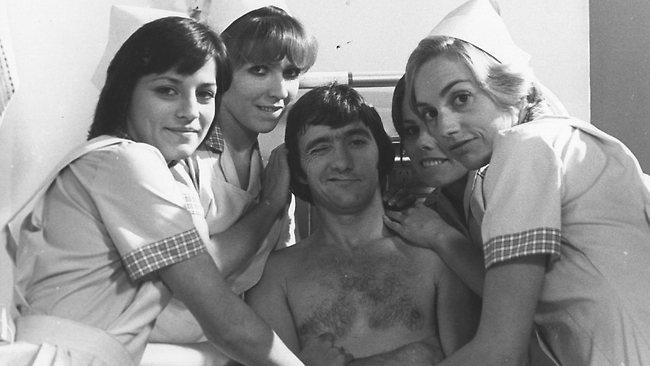Purple buttocks the end that started true blue debate
SITTING in the television critic's chair at The Australian is a posterior that entered posterity.

SITTING in the television critic's chair at The Australian is a posterior that entered posterity, blackened television screens and prompted the resignation of an ABC chairman.
"Graeme Blundell's bum may not at first seem a particularly inspiring cause," wrote Phillip Adams in September 1976. "Yet those who regard the ABC as one of Australia's more valuable institutions must rally around it. While we do not necessarily agree with it, we must fight to the death for his right to expose it."
The TV adaptation of Alvin Purple had been taken off air after three episodes by ABC chairman Henry Bland when Blundell's buttocks proved too much for some viewers. ABC staff saw his decision as an assault on their independence, but to Bland it was a battle for managerial authority.
The staff got their way, Alvin Purple continued for 10 more episodes and Bland resigned, frustrated by Malcolm Fraser's irresolute support for ABC reform.
In his resignation letter five months later, he said the government's "vacillation" on legislative reform had "given new encouragement to those who wave the banner of the ABC's independence, but whose real purpose is to use the ABC as they will".
Times change. In 1975, Graham Kennedy was taken off commercial television for saying "faaaaaark" even though he claimed to be impersonating a crow. Yet last week Q&A presenter Tony Jones hardly blinked as the f-bomb was dropped three times by panelist Mona Eltahawy and once by Jon Ronson.
Now, as then, disputes about public obscenity and profanity are rarely what they seem, which is why the intrusion of the f-word into serious debate on the ABC's Q&A should not go undiscussed.
The f-word is not uncommon in television drama and comedy, but its intrusion into televised civic debate in a series described by the ABC as "adventures in democracy" crosses a threshold.
It would be a stretch to claim Q&A is merely reflecting community values. In a Roy Morgan poll for Channel Ten's Can of Worms this year, 64 per cent thought Australians swore too much.
Context is everything. Across the Tasman, a Broadcasting Standards Authority survey last year found that 50 per cent of New Zealanders thought the f-word was acceptable in late night stand-up comedy, but only 29 per cent thought it should be used in serious interviews.
Before the Whitlam years, the default setting was restraint. Richard Boyer, the ABC's post-war chairman, positioned the corporation as "a much-needed centre of national unity, solid and serene in the middle of our national life, running no campaign, seeking to persuade no opinion".
Peter Coleman wrote in 1960 of directors checking in with the switchboard every hour "to see if some prig who may have influence has complained about something vaguely 'offensive' " and of an apology to a listener disgusted that beer had been mentioned on a children's radio program.
Whitlam's election in 1972 unleashed permissiveness. Resisting "interference" meant giving the finger not just to the postmaster general but management. Whitlam's appointed chairman Richard Downing, a radical libertarian and permissive parent, said the ABC should "force the pace" of social change. "There has been a remarkable change in public acceptance of four-letter words," Downing told The Sydney Morning Herald in June 1973. "My own daughter Emma was using four-letter words at the age of three. It took a great deal of restraint not to try and stop her."
In January 1975, Skyhooks' "You Only Like Me 'Cause I'm Good in Bed", considered too offensive for commercial radio, was the first track played on the ABC's new rock station 2JJ. Historian Ken Inglis describes its jean-clad staff behaving like "gentle revolutionaries who had seized a radio station and were not quite sure what to do with it".
Opposition to censorship, dressed in the language of freedom, was a challenge to the old guard's cultural authority.
The four-letter word, rather than the antiwar moratoriums, was the real rallying cry of cultural revolutionaries of the late 1960s and early 1970s as the post-federation generation gave way to tertiary-educated baby boomers.
Earlier this year, Q&A's Tony Jones illustrated the resilience of the Vietnam myth when admonishing a guest for Generation Y's Facebook obsession. "I was involved in a generation that went out in the streets, turned cars over during the Vietnam War," he said.
The myth is pervasive. When old friends got back together for a reunion party in David Williamson's play Don Parties On, set on the night of last year's election, Don and Mal reminisce about police horse charges: "The Vietnam War was hideous bullshit. We fought it mate. We fought it. I loved it. I loved every moment of it. There was purpose. There was idealism. There was selflessness. There was comradeship. There was camaraderie."
The script of Williams's original Don's Party, which opened in 1971, destroys that fantasy. The word "Vietnam" does not appear, neither is there talk of demonstrations or American imperialism. Forty years on, the myth is finally exposed, in a conversation over a glass of Penfold's 389:
Mal: The sixties were magic in their way, weren't they? Hand-to-hand combat on the battlefield of social change.
Don: Our kids resent it, you know...
Mal: Their only defence is to deride it and us depict it as just sex, drugs and rock 'n' roll.
Don: Which it was. But it was so much more.



